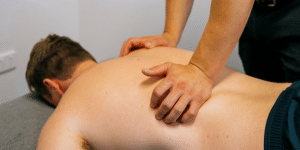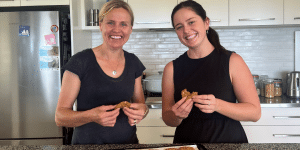The impacts of poor body image and how a dietitian can help
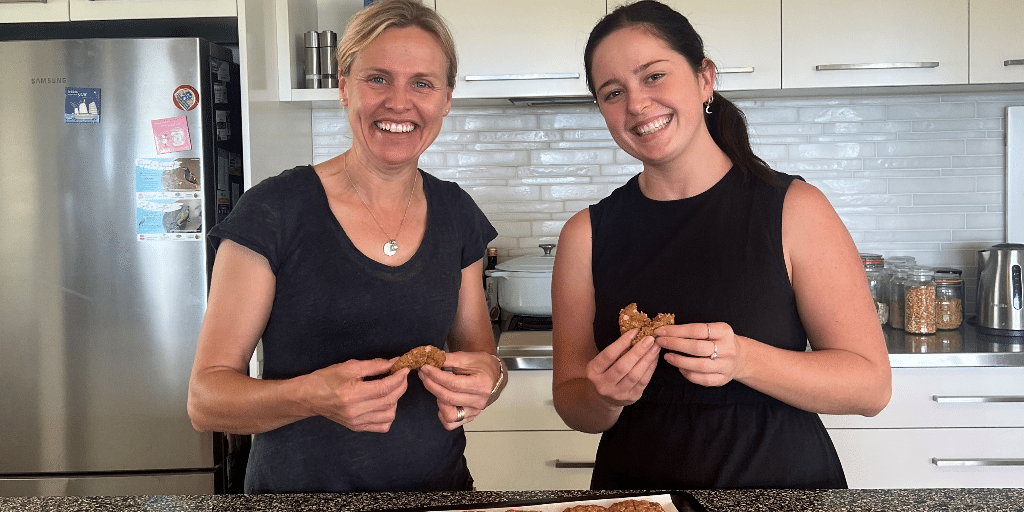
What is body image?
Body image is a combination of the thoughts and feelings that you have about your body. Feelings can move between positive and negative experiences. It is influenced by internal factors (someone’s personality, perception of themselves and expectations) and external factors (media, family members, friends and social pressures).
Is body image a problem in Australia?
Two leading advocates for improving body image in Australia cited body image as a significant problem. Glenn Mackintosh, a psychologist who’s passionate about helping people transcend eating, physical activity, weight and body image, suggests we are currently in “A body image epidemic”. In her acceptance speech for Australian of the Year 2023, body image activist Taryn Brumfitt said “There is so much despair in this nation for children and adults when it comes to what we think and how we feel about our bodies. Australia, it is not our life’s purpose to be at war with our body”
A 2018 survey of over 3,000 Australian adults by the Butterfly Foundation found an overwhelming number of Australians struggle with poor body image (Butterfly, 2018). The survey findings include:
- 73% of people wished they could change the way they look.
- Over 40% of people are dissatisfied with their appearance.
- 66.6% of people remember being bullied or teased for their appearance at some stage in their life.
- 41.5% of people most of the time or always compare themselves to others on social media
- 53.6% of people rarely or never speak positively about their appearance.
https://butterfly.org.au/wp-content/uploads/2020/05/Insights-into-Body-Esteem-Report-PDF2.pdf
Teens and body image
Teenage years are a tough time for ones body image, making them at greater risk. Throughout the teenage years, rapid growth and hormonal change is accompanied by increased self-awareness and an elevated view of the importance of appearance, based on perceptions of a ‘desirable’ body shape. Given these ideals are unattainable for most, it’s not surprising that most teenagers (76%), regardless of gender, are concerned about body image. 45-58% of girls and 30-44% of boys, “think about being thinner” (McCabe MP, 2004)
Although teenagers are at increased risk, people of all ages and genders can be affected. Some risk factors include,
- Poor body image developing in early childhood and adolescence
- Puberty, fertility treatments, pregnancy and post pregnancy
- Girls and women experience body dissatisfaction more frequently than boys and men
- People with low self-esteem or other mental health problems
- People with perfectionist tendencies, high achievers, ‘black and white’ thinkers
- People living in a larger body, who have been subject to teasing/bullying, or who have experienced weight stigma and discrimination
Does dieting contribute to poor body image?
Many people can identify with being in the “Problematic dieting cycle” created by the Butterfly Foundation. Working on improving your body image is important as losing weight will not solve those concerns, and a positive body image allows for more positive change.
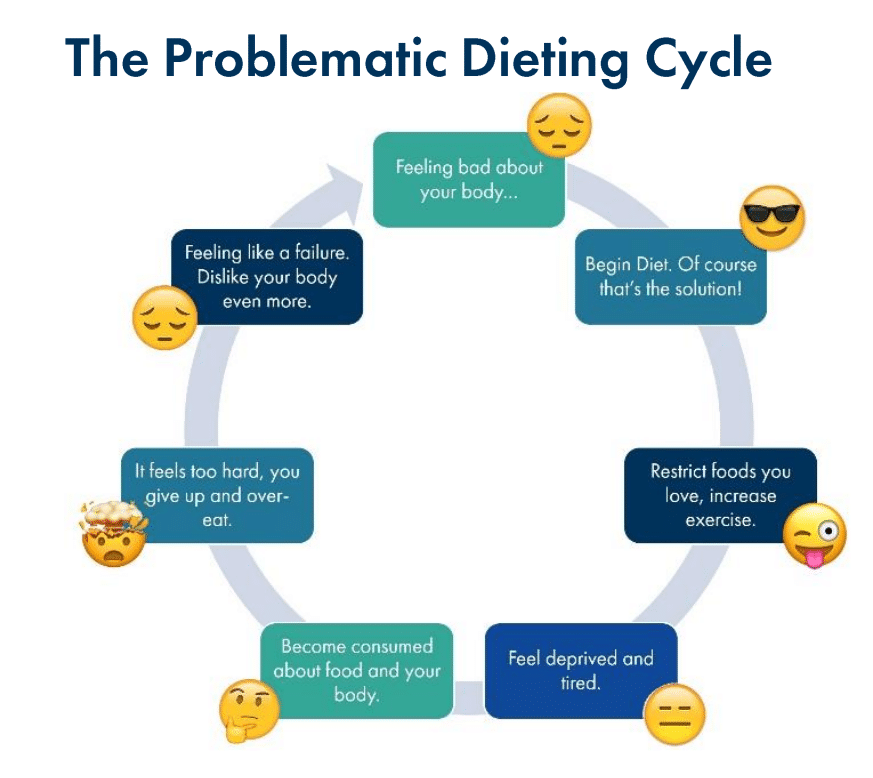
When can dieting shift to unhealthy behaviours?
Firstly, let’s define “Dieting” and “Disordered eating”.
Diet / Dieting: Over restriction of calories, cutting whole food groups, strict rules around food, excessively exercising and fad diets
Disordered eating: sits on a spectrum between normal eating and an eating disorder and may include symptoms and behaviours of eating disorders, but at a lesser frequency or lower level of severity. May include restrictive eating, compulsive eating, or irregular or inflexible eating patterns.
A negative body image increases the risk of engaging in unhealthy behaviours, including dieting or, over-exercising and other disordered eating (DE) behaviours.
Dieting is the biggest predictor of eating disorders (ED). And EDs have one of the highest mortality rates of all mental illnesses worldwide. The behaviours associated with EDs / DE can lead to health complications. EDs can also affect a person’s ability to perform everyday tasks and maintain positive relationships with others which can adversely impact on their overall quality of life. (Haslam et al. Journal of Eating Disorders (2021) 9:159 https://doi.org/10.1186/s40337-021-00512-7)
What does a healthy relationship with food and exercise mean?
Unfortunately due to many mixed messages and people without health degrees giving advice there is lots of confusion about what healthy means. Healthy does not equal weighing less or being overly restrictive. Have a look at the table and see which side you identify with? If you need help and clarity on how to create a healthy lifestyle that suits you, we recommend seeing a health professional (Accredited practising dietitian, exercise physiologist, psychologist).
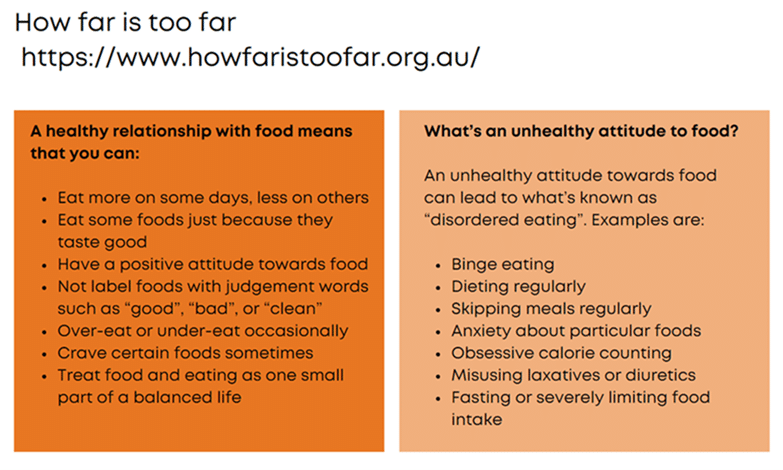
How can a dietitian assist in improving body image and improve people’s relationship with food?
A dietitian can help improve someone’s body image in lots of different ways. Our consults are individualised, and we can work with you to find the best place to start. Some ways a dietitian can help:
- Support individuals to identify and overcome food fears and guilt that may be contributing to negative body image.
- Establish regular eating. Regularity is one of the first steps of improving eating habits and someone’s relationship with food
- Educate clients on how to fuel their body and ensure there is nutritional adequacy, to support physical and mental health
- Create personal / realistic health goals – based on health not weight
- Challenge diet culture
- Debunk nutrition myths
- Encourage self-compassion and collaborate with mental health professionals
- Unfollowing accounts that make them feel bad, discuss negative body talk and encourag positive body talk
- Address weight concerns in a sensitive way once prior work has been done to reduce risks
If you want help, book in with one of our friendly dietitians here. If you have concerns about yourself or a loved one, talk to a GP, parent, friend or visit some of the useful sites below.
https://insideoutinstitute.org.au/
https://www.howfaristoofar.org.au/
About the author
Scarlett Gray dietitian at Ethos Health, has a passion for helping improve people’s relationship with food and their body. She has completed extra training in eating disorders and addressing body image.

